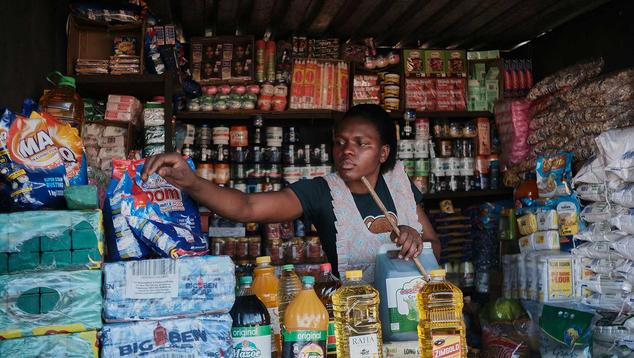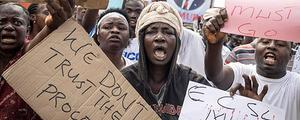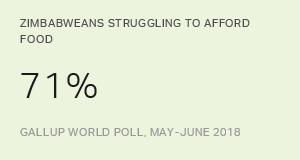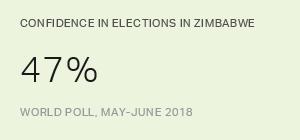Story Highlights
- 62% of Zimbabweans feel their standard of living is getting worse
- 37% feel safe walking alone at night, the lowest since 2008
- 53% are confident in the honesty of elections
WASHINGTON, D.C. -- Zimbabweans will head to the polls on Wednesday to vote in their first presidential election in five years. This election is taking place as Zimbabwe’s economy is still struggling against headwinds, including a notoriously unstable currency that has dropped more than 50% against the dollar in the past month.
For many Zimbabweans, the outlook appears increasingly gloomy, as 72% say the economic conditions in their city or area are getting worse and 20% say they are getting better. This is reflected in reported difficulties in finding employment, with 72% of residents saying it is a bad time to find a job in their area.
Quick Summary: Incumbent President Emmerson Mnangagwa, an 80-year-old former soldier and defense minister, is the current frontrunner. Taking office in a 2017 coup against then-leader Robert Mugabe, Mnangagwa’s ZANU-PF party has held power for the last 43 years and has been repeatedly accused of crackdowns and suppression of opposition activists and party members.
While there are officially 11 candidates standing for president, the chief opposition to the ZANU-PF is Nelson Chamisa of the Citizens Coalition for Change (CCC), who narrowly lost to Mnangagwa in the 2018 election.
Living Standards Trending Downward: The Zimbabwean dollar has faced severe instability and pressure for decades, undergoing several revaluations and redenominations. The current iteration lost 86% of its value in the first five months of this year, while inflation across the country has topped more than 86% in the past year, among the highest in the world.
Despite improving GDP growth over the past decade, residents of Zimbabwe are still in economic pain. Fewer than three in 10 Zimbabweans (29%) feel their living standards are getting better, while 62% feel they are getting worse. Similarly, just 4% of residents say they are living comfortably on their present income, versus 44% who report finding it very difficult on their present income. While economic conditions were difficult under Mugabe, Zimbabweans have been more pessimistic since Mnangagwa assumed power at the end of 2017.
Economic troubles have fueled migration out of Zimbabwe over the past two decades, with many choosing to relocate to South Africa for jobs. Roughly 1 million Zimbabweans work in South Africa, a situation that has led to backlash from local South Africans in recent months.
Despite this growing hostility, residents' desire to migrate out of Zimbabwe remains strong. Over a third of Zimbabweans, 35%, said in 2022 that they would like to move permanently to another country, the highest percentage since 2009.
Violence and Corruption Remain Entrenched: Violence, both criminal and state-sponsored, further weighs on the lives of Zimbabweans. The percentage of residents reporting that they feel safe walking alone has seen a steep decline from its peak of 57% in 2015, dropping nearly every year since to 37% today.
Residents also express concerns about crime within the country’s government and institutions. Sixty-eight percent of Zimbabweans feel corruption is widespread within their government, while 76% see it as widespread within businesses in Zimbabwe. Moreover, Human Rights Watch found that torture and arbitrary arrests persisted in 2022.
Half of Zimbabweans Have Faith in Elections: After allegations of media bias and voter intimidation during the 2018 election shook Zimbabweans’ confidence in their elections, they have steadily grown more confident. While this trust dipped slightly last year, the 53% who said they were confident is on the high end of all measures since 2010. The current level is also above the sub-Saharan Africa median (46%).
Implications
Zimbabwe has long stood as a symbol of economic mismanagement, with painfully high rates of inflation plaguing the country over the past two decades. Rising food prices, power outages and triple-digit inflation have put the economy front and center in the upcoming electoral contest. While Mnangagwa maintains his frontrunner position, likely aided by his command of state resources and power, the painful economic conditions have led to a very dissatisfied electorate who may seek new leadership.
To stay up to date with the latest Gallup News insights and updates, follow us on Twitter.
For complete methodology and specific survey dates, please review Gallup's Country Data Set details.
Learn more about how the Gallup World Poll works.




